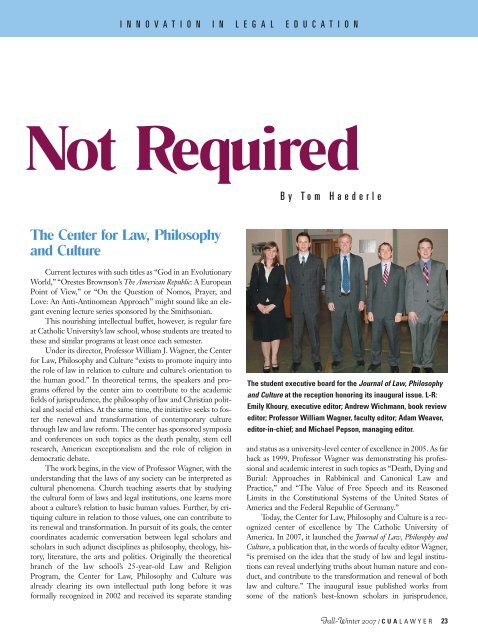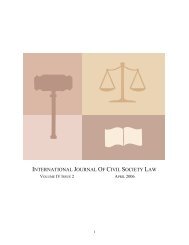CUA Cover Winter 2005 final (Page 2) - Columbus School of Law
CUA Cover Winter 2005 final (Page 2) - Columbus School of Law
CUA Cover Winter 2005 final (Page 2) - Columbus School of Law
- No tags were found...
You also want an ePaper? Increase the reach of your titles
YUMPU automatically turns print PDFs into web optimized ePapers that Google loves.
I N N O V A T I O N I N L E G A L E D U C A T I O NNot RequiredBy Tom HaederleThe Center for <strong>Law</strong>, Philosophyand CultureCurrent lectures with such titles as “God in an EvolutionaryWorld,” “Orestes Brownson’s The American Republic: A EuropeanPoint <strong>of</strong> View,” or “On the Question <strong>of</strong> Nomos, Prayer, andLove: An Anti-Antinomean Approach” might sound like an elegantevening lecture series sponsored by the Smithsonian.This nourishing intellectual buffet, however, is regular fareat Catholic University’s law school, whose students are treated tothese and similar programs at least once each semester.Under its director, Pr<strong>of</strong>essor William J. Wagner, the Centerfor <strong>Law</strong>, Philosophy and Culture “exists to promote inquiry intothe role <strong>of</strong> law in relation to culture and culture’s orientation tothe human good.” In theoretical terms, the speakers and programs<strong>of</strong>fered by the center aim to contribute to the academicfields <strong>of</strong> jurisprudence, the philosophy <strong>of</strong> law and Christian politicaland social ethics. At the same time, the initiative seeks to fosterthe renewal and transformation <strong>of</strong> contemporary culturethrough law and law reform. The center has sponsored symposiaand conferences on such topics as the death penalty, stem cellresearch, American exceptionalism and the role <strong>of</strong> religion indemocratic debate.The work begins, in the view <strong>of</strong> Pr<strong>of</strong>essor Wagner, with theunderstanding that the laws <strong>of</strong> any society can be interpreted ascultural phenomena. Church teaching asserts that by studyingthe cultural form <strong>of</strong> laws and legal institutions, one learns moreabout a culture’s relation to basic human values. Further, by critiquingculture in relation to those values, one can contribute toits renewal and transformation. In pursuit <strong>of</strong> its goals, the centercoordinates academic conversation between legal scholars andscholars in such adjunct disciplines as philosophy, theology, history,literature, the arts and politics. Originally the theoreticalbranch <strong>of</strong> the law school’s 25-year-old <strong>Law</strong> and ReligionProgram, the Center for <strong>Law</strong>, Philosophy and Culture wasalready clearing its own intellectual path long before it wasformally recognized in 2002 and received its separate standingThe student executive board for the Journal <strong>of</strong> <strong>Law</strong>, Philosophyand Culture at the reception honoring its inaugural issue. L-R:Emily Khoury, executive editor; Andrew Wichmann, book revieweditor; Pr<strong>of</strong>essor William Wagner, faculty editor; Adam Weaver,editor-in-chief; and Michael Pepson, managing editor.and status as a university-level center <strong>of</strong> excellence in <strong>2005</strong>. As farback as 1999, Pr<strong>of</strong>essor Wagner was demonstrating his pr<strong>of</strong>essionaland academic interest in such topics as “Death, Dying andBurial: Approaches in Rabbinical and Canonical <strong>Law</strong> andPractice,” and “The Value <strong>of</strong> Free Speech and its ReasonedLimits in the Constitutional Systems <strong>of</strong> the United States <strong>of</strong>America and the Federal Republic <strong>of</strong> Germany.”Today, the Center for <strong>Law</strong>, Philosophy and Culture is a recognizedcenter <strong>of</strong> excellence by The Catholic University <strong>of</strong>America. In 2007, it launched the Journal <strong>of</strong> <strong>Law</strong>, Philosophy andCulture, a publication that, in the words <strong>of</strong> faculty editor Wagner,“is premised on the idea that the study <strong>of</strong> law and legal institutionscan reveal underlying truths about human nature and conduct,and contribute to the transformation and renewal <strong>of</strong> bothlaw and culture.” The inaugural issue published works fromsome <strong>of</strong> the nation’s best-known scholars in jurisprudence,Fall–<strong>Winter</strong> 2007 / C UALAWYER 23
















